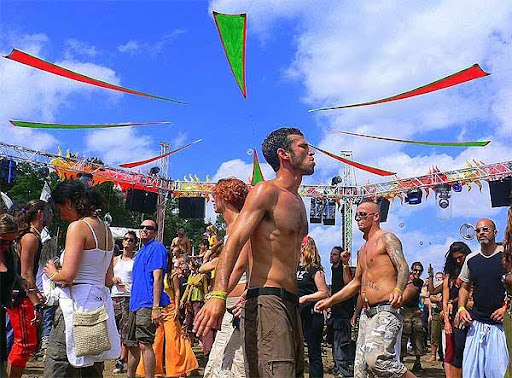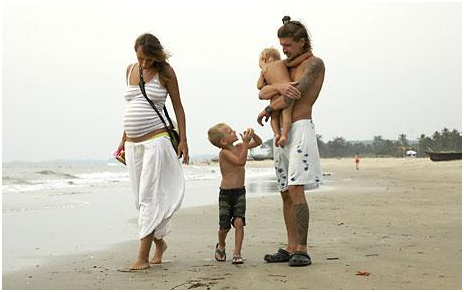Russians in search of paradise in Goa; while Goans search for a paradise abroad..
Copyrights © GASPER CRASTOYulia and Timofei Solovyev, with their two children Uma and Om, have swapped the Moscow rush hour for Goan sunshine on a beach in Arambol, Goa
Photo: Kristina Sazonova - Epsilon
An Article in The Telegraph (March 2010):
Tired of city life, Russians are increasingly taking time out in Goa – and some aren't going home.
Five years ago, Yulia Solovyeva's life was like that of any other young professional coming from the provinces to Moscow in search of a career. Mornings began with a quick cup of coffee in a tiny rented room, a walk through slushy streets to the metro, carriages packed with tired faces, and on to the office where she worked as an interpreter.
"I felt like I lived in a cage," says Solovyeva, relaxing in her Goa home, legs folded into the lotus position. "We smoked cigarette after cigarette in constant stress; I could never imagine raising children in that aggressive Moscow environment."

And so, like thousands of other restless young Russians unhappy with city life, she headed to the Indian state of Goa in search of shanti – inner peace. The Russian exodus to Goa has become a trend, and many are moving there for good. Cheap daily charter flights are now carrying thousands of Russians to the former Portuguese colony famous for its beaches and laid-back mood that have been popular with British ravers and drop-outs for decades.
The allure of India has even spawned a best-seller in Russia, The Goa Syndrome, a book about living and working in Goa by Alexander Sukhochev – also known as DJ Sa Shanti, a resident of the Indian state since 2003.
Solovyeva's husband Timofei prefers to describe the drift of Russians to Goa as a movement of "up-lifters" rather then "down-shifters", the term used in the West. The Solovyevas' two children were born in Goa. Their son's name is Om and their daughter's name is Uma after the Hindu god Shiva's wife. There are already two Umas in the growing Russian community and more could be on the way: the community has celebrated a baby boom in the last few years.
Like many other Russians, the couple set up their own business in Goa. "Our yoga resort was the first business on this street five years ago, and now we have dozens of businesses along this shore," says Timofei during a tour of his neighbourhood in Arambol in northern Goa.
Flyers in Russian are pinned to palm trees advertising yoga, massage, traditional Indian music and dance classes for visitors.
Ilya Demenkov, 27, grew tired of his work as a computer programmer at a Moscow IT company. He flew to Goa last year to realise his dream of opening a kitesurfing school. "I came here to begin my own business and find a girlfriend," he says.
The allure of India has even spawned a best-seller in Russia, The Goa Syndrome, a book about living and working in Goa by Alexander Sukhochev – also known as DJ Sa Shanti, a resident of the Indian state since 2003.
Solovyeva's husband Timofei prefers to describe the drift of Russians to Goa as a movement of "up-lifters" rather then "down-shifters", the term used in the West. The Solovyevas' two children were born in Goa. Their son's name is Om and their daughter's name is Uma after the Hindu god Shiva's wife. There are already two Umas in the growing Russian community and more could be on the way: the community has celebrated a baby boom in the last few years.
Like many other Russians, the couple set up their own business in Goa. "Our yoga resort was the first business on this street five years ago, and now we have dozens of businesses along this shore," says Timofei during a tour of his neighbourhood in Arambol in northern Goa.
Flyers in Russian are pinned to palm trees advertising yoga, massage, traditional Indian music and dance classes for visitors.
Ilya Demenkov, 27, grew tired of his work as a computer programmer at a Moscow IT company. He flew to Goa last year to realise his dream of opening a kitesurfing school. "I came here to begin my own business and find a girlfriend," he says.

Foreigners at a carnival in Goa
Alla Duhl, a St Petersburg painter, found that she could live on just over £300 a month in Goa, including rent for a studio and a room in a house with a tropical garden. "Maybe a British lady would find this environment lacking comfort, but we are used to crowded buses and dirty streets," she says, "so Goa feels like home to us."
Duhl, who paints portraits of local people on pieces of antique dark wood, says she planned to exhibit and sell her art pieces this summer, during one of her short visits to Russia.
Last year, 80,000 Russians flew into Goa, and, according to the Indian embassy in Moscow, 1,400 did not return home before their visas expired.
"Some tourists decide to stay and live in India permanently," says the embassy's secretary.
"Some, we hear, even burn their Russian passports to break off all the connections with home."
On their return to the cold of Russia, some fans of Goa try to preserve their state of shanti. Increasingly, Russian cities have yoga clubs, and practice of the physical and mental discipline has taken off after being barely visible just a few years ago. A new chain of Indian stores, The Way to Yourself, offers everything from Indian tea to little tin kettles – good for washing nasal energy channels or watering flowers.
Recently, fans of Goa gathered at Gazgolder, a hip Moscow night club, for a "Goa Memories" party. Clubbers in Ali Baba baggy pants and Shiva shirts, sun glasses and flip flops, with third eyes painted on their foreheads, danced to tam-tam music under a big video screen featuring Goan scenes: Indian women in bright saris on motor bikes, enormous palm trees, and golden sunshine.
